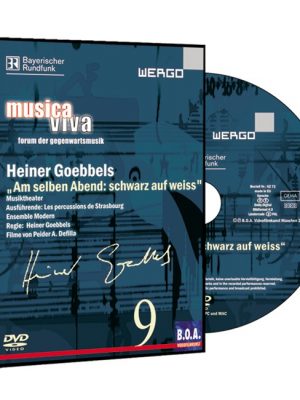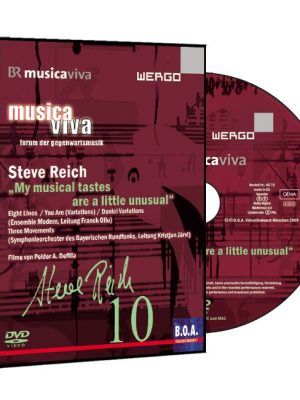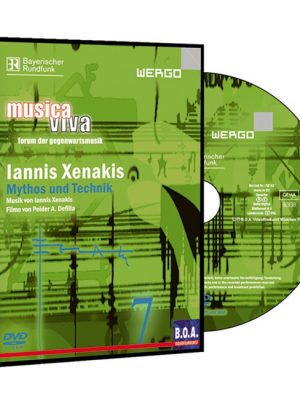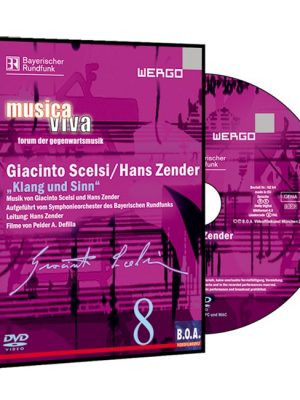Musica Viva DVD 6
€14,95
Musica Viva DVD 6
King Stag (From the heart of the magical land)
“I still hope that one day my dream of a performance of Re Cervo as I imagine it will come true. Perhaps on my 80th birthday.” – Hans Werner Henze did not have to wait quite as long as he had feared in his letter to Jean-Pierre Ponnelle in 1965 to see his opera König Hirsch, completed in 1955, performed on stage as he had imagined.
Description
King Stag (From the heart of the magical land)
“I still hope that one day my dream of a performance of Re Cervo as I imagine it will come true. Perhaps on my 80th birthday.” – Hans Werner Henze did not have to wait quite as long as he had feared in his letter to Jean-Pierre Ponnelle in 1965 to see his opera König Hirsch, completed in 1955, performed on stage as he had imagined. However, 30 years were to pass before Dennis Russell Davies performed the original four-hour version of the piece in Stuttgart in 1985, almost unabridged, and helped the opera to a triumphant success. It had been denied this at its first performance in Berlin in 1956. At the time, it had been cut so drastically that Henze tried in vain at the last minute to have the Schott publishing house ban the performance of Torso. In his autobiography, the composer was still indignant about the actions of the conductor Hermann Scherchen, who “raged through the score with a red pencil” without any understanding for the work. In the years that followed, Scherchen’s rigorous approach resulted in numerous other abridged versions, as hardly anyone believed that the whole piece could be performed after the disaster of the premiere. Even Henze was so disheartened by the fate of his König Hirsch that he produced a new version of the opera himself in 1963 as an authorized short version.
Why was it so difficult to realize the original version of the piece on stage in the 1950s and 60s? According to Henze, Scherchen is said to have defended his cuts, which took away from the opera’s substance, with the words: “But my dear, we don’t write arias anymore today.” What was remarkable about this justification – apart from the criticism of the alleged backwardness – was the phrase “we”. This “we” referred to the avant-garde, which set the tone at the time, and its standards of value and very aptly marked Henze’s position as an artist in post-war Germany, who increasingly felt like an outsider in the New Music scene. Although he had initially accepted the strict
compositional criteria that were propagated at the International Summer Courses in Darmstadt. In the course of the 1950s, however, he felt them to be increasingly dogmatic and restrictive, and his need to distance himself from them grew ever stronger. In this sense, the opera König Hirsch marks a turning point in Henze’s artistic
development.
The work was written in Italy, where the composer had emigrated in 1953, partly due to his increasingly apparent artistic isolation. Italy fascinated him and the Mediterranean lifestyle provided him with the mental balance he needed to compose. He was certainly also taken with the primal musicality of the Italians, which unfolded in the sensually beguiling cantabile of folk song and opera, and was particularly interested in Neapolitan folk song. He discovered elements of North African folklore in it and studied its melodic and rhythmic structure. All of this was also reflected in the creation of König Hirsch, together with the desire to write an opera which, like the Italian one, was to be a natural, heightened continuation of the singing of the people on the street.
The material for this was provided by the tragicomedy Il re cervo by Carlo Gozzi, which the poet Heinz von Cramer transformed into a libretto. In a classic constellation of three with many enigmatic secondary characters, it is about the fate of a king who grew up with the animals in the forest and is now supposed to embody the ruler of the human world. The naturalness and naivety of the king, but also the intrigues of the autocratic governor, make it difficult for him to identify with his office. Only his love for a girl finally prompts him to leave his beloved forest and embrace his destiny as king.
The story, inspired by Indian fairy tales and full of fantasy and mystery, appealed to Henze, especially as it imagined “a bygone, baroque Italy” and thus appealed to the composer’s enthusiasm for Italy. The allure of the foreign made it easy for him to free himself from the dogmas and techniques of the contemporary avant-garde and supported him in his feeling of being able to work without any old baggage.
Musically, this is expressed in the clear influence of southern Italian folklore with its Arabic-like turns of phrase and rich melismatics. Henze reinforced the southern coloring with the opulently flowing sensuality of the orchestral part. Formally, however, he placed the clearly structured, through-composed piece entirely in the German late-Romantic tradition of Richard Strauss and Alban Berg, which has led some commentators to dismiss the Italian character of the opera as mere staffage.
The special combination of southern melos and northern formal will also characterizes the love duet towards the end of Act 1. It expresses the budding love between the king and the girl, who was initially forced to become a bride against her will. At the beginning, the voices of the king and the maiden intonate in unison a longingly stretched, melodious theme adorned with oriental-style embellishments, which they present in the course of the scene, sometimes together, sometimes as soloists in various variations. This results in a formal sequence of seven sections: The love theme is followed by five increasing variations, culminating in a coda in which the couple confess their love for each other. The text of the duet reveals itself as a cryptic dialog, which on the one hand refers to other passages in the libretto and on the other hand corresponds to the fantastic character of the piece. As is often the case throughout the opera, a surreal atmosphere is created at times. In particular, the King’s words “only when we dream do we become awake” reveal a clear tendency towards surrealism. The omnipotence of dreams and their higher reality as a principle of surrealism left clear traces in von Cramer’s libretto and inspired Henze to create suggestive, often seemingly enchanted sounds, without, however, unfolding the destructive consequences that this artistic movement had in store. Thus dream and association in König Hirsch are merely an expression of mysterious supernaturalness. Unlike in Bohuslav Martinuºs opera Julietta, for example, which is almost 20 years older, love for a girl does not lead to a delusional dream state from which there is no way back to the real world. On the contrary: it is precisely through the memory of his love that the king finds his way back to the consciousness of reality.
The motivation of the king, who had fled from the intrigues of the governor into the forest – a symbol of the unconscious – to finally return to the city and carry out his duties, is made clear musically. In the final scene of Act 2, two oboes quote a passage from the love duet and thus provide the decisive impetus for the king’s decision to return. Conversely, the theme of the love duet is also heard earlier, in the king’s aria, where it characterizes his still undefined longing and search for a sense of belonging, which is later fulfilled in his love for the girl.
From this perspective, the love duet in Act 1 plays a key role, as its musical structure in particular is essential for understanding the entire work. It is therefore not surprising that this scene initiated Henze’s work on the opera: “The first notes for Act 1 of König Hirsch were those for the duet between the girl and the young king: ‘What can we do? The air was full of open cages. Our eyes became birds and flew away. They were in unison, diatonic, and it seemed to me as if the notes really came from the heart of the magical land that surrounded me”. Henze describes the composition in his autobiography
Henze saw the love duet as an act of initiation: his self-chosen new homeland of Italy was now opening up to him on a musical level, just like the hero in the love duet of Act 1, the composer was at the beginning of a process of identification at the time he wrote it. Just as love for a girl gave the king the strength to learn to assert himself as a ruler in the world of intrigue, Henze also drew the inspiration he longed for from the landscape and culture of his adopted country, Italy, which allowed him the freedom of artistic development beyond all dogmas and conventions. This took place in a very personal synthesis of tradition and modernity, which characterizes Hans Werner Henze’s musical style. This process of change in Henze’s work is not only expressed in the music of König Hirsch, but is also symbolized by the fate of the title hero. The love duet in Act 1 acts as a concentrate of this metaphorical meaning of the piece, because it represents a first small victory for the title hero and the composer in their struggle for free self-development.
Program musica viva (May 11, 2006)




